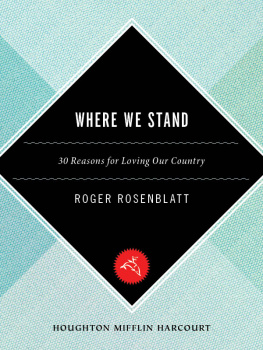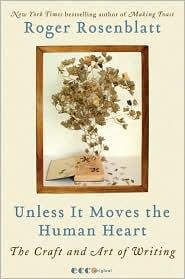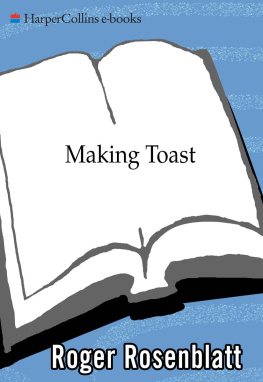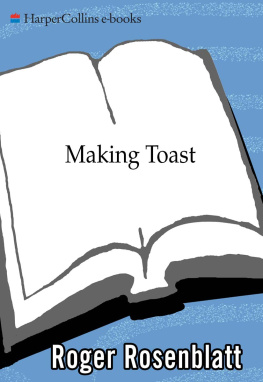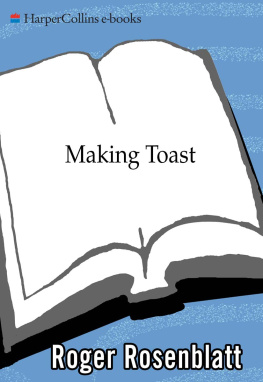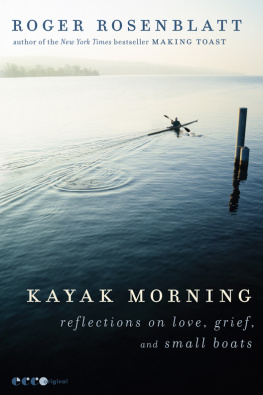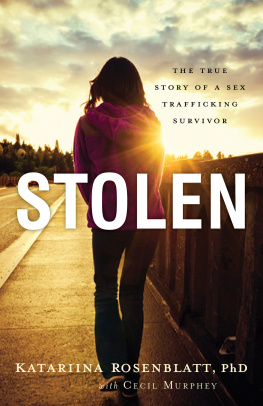Copyright 2002 by Roger Rosenblatt
All rights reserved. No part of this publication may be reproduced or transmitted in any form or by any means, electronic or mechanical, including photocopy, recording, or any information storage and retrieval system, without permission in writing from the publisher.
For information about permission to reproduce selections from this book, write to Permissions, Houghton Mifflin Harcourt Publishing Company, 215 Park Avenue South, New York, New York 10003.
www.hmhbooks.com
Let Us Now Praise Famous Cities, Everyones a Liberal (Oh, Go Ahead, Read It Anyway), and I Guess We Let Anybody In were originally published in different forms and under different titles in the New York Times.
We Have a Very Well Written Constitution, Our House Is a Very Very Very Fine House, We Play Ball, Annie Drops Her Gun (Smile When You Say That), But Were Extremely Disloyal, We Are a Bunch of Losers, Ourselves, We Shame Monsters, We Dig That Hokey, Corny Presidential Talk, Basically, We Ye Out of This World, A River Runs Through Us, Still Historical after All These Years, and God Is Not on Our Side were originally published in different forms and under different titles in Time magazine. Time Inc. Used with permission.
The Library of Congress has cataloged the print edition as follows:
Rosenblatt, Roger.
Where we stand: 30 reasons for loving our country, Roger Rosenblatt.1st ed.
p. cm.
ISBN 0-15-100722-5
I. National characteristics, American. 2. United StatesCivilization. 3. United StatesCivilizationPhilosophy. 4. Social valuesUnited States.
I. Title.
E169.1.R77556 2002
973dc21 2002001753
eISBN 978-0-547-67854-2
v1.1112
For Jessica,
a brand new American
Preface
This book is about love of countrynot unalloyed love, or unwary, unquestioning love, or infatuated, one-night, wink-in-the-bar love. But love, pure, steady, and complicated. I wrote it in a time when I found it useful to dredge up feelings about America that for a long time lay inside me. These feelings gave me comfort and resolve, and they are offered to you in hopes of the same. If you are put in the position of defending your way of life, as we have been, it may help to remember that we live in a pretty great country.
So, what follows is a collection of short essays, each on an aspect of American dreams and realities, that in aggregate attempt to make a case for preserving the core values of the country, along with all the oddities and nonsense that make us us. Some of the pieces are more confident than others. When I write about the brilliance of the Constitution, or the separation of church and state, I am a lot more certain that we have achieved what we sought to achieve than, say, when I write about poverty, race, or the treatment of children.
I dont spend a lot of words on the problematic issues, because they are well-known, and because I see them as unfinished business in a country that, sooner or later, has managed to deal with its unfinished business. These are the pillars of the Republic: to protect the weaker, to rescue the endangered, to dignify every individual, but, centrally, to continue the search for a more noble expression of existence. However we have blundered in the history of this search, it is where we stand.
Some of these essays discuss familiar rights and principles; some Ive made up. There are pieces on why one is lucky (I should say blessed) to live in a place where no one version of God prevails. There are pieces about the beautyand the lusty humorof the old melting pot; about the absolute rights of those who are different from the majority; about the need to protect the freedom of authors and artists, especially the most offensive of these; and about the nuttiest excesses of freedom as well. Forgive me, but I also defend the existence of lawyers.
And there are some other values that occurred to me as I began to write: the right to lead a hard and complicated life; the right to mess up or improve our behavior; the right to be suspicious; the right to yearn, particularly for the unreachable; the right to be out of things, to laugh at our leaders, to lose, to dream, to drift.
Putting this book together taught me something. In the twenty-seven years or so that I have done this work, I have written essays about presidents, prisons, sports, the homeless, wars, books, movies, crooks, music, national foolishness, and other various subjects. I have drawn on many of these pieces here. But when I was writing them originally, I was wholly unaware that over the years another, larger, story in which they were all connected was writing itself in my mind. I had no idea how deep my admiration for my country wentno matter how often it was qualified. I had no idea that my affection was so strong. The process of writing was an extension of feelings stemming from September n, when I teared up day after day. You too?
Anyway, the larger story is this book. The fact that it rose so rapidly and definitely in me suggests that a similar tale murmurs in you as well, in all of us who have shared the shaky joy of living in a very rare bird of a country I am sure that the book contains some lulus of errors and porous arguments, and I know that it presents some fighting words. But it is the best I could do. The book was written because I felt like writing it, felt like saying anything I chose to say, and knew that I had the freedom to say itif you get my drift.
R OGER R OSENBLATT
1. We Have a Very Well Written Constitution
In which the fellow who actually wrote the document (no, it wasnt Jefferson or Madison) is finally given his due
***
It helps to recognize that we were founded on a class document. When our Constitution was being made ready, the framers called upon a guy named Jacob Shallus to put it on paperor parchment, actually. Shallus was an ordinary but skilled citizen, the son of a German immigrant, a soldier, a patriot, a father of eight, and, at the time of the Constitutional Convention, assistant clerk to the Pennsylvania General Assembly. The convention handed him the document for copying on September 15, 1787. The process was called engrossing, which suggests a nice double meaning, and it meant copying the text out at an elegant angle in large, legible script.
Much of nature contributed to the enterprise. The four sheets of parchment were vellum, the skin of a lamb or calf, stretched, scraped, and dried. The ink was a blend of oak galls and dyes. The light by which he worked was probably an oil lamp. His instrument was a feather quill. Human nature was represented in the person of Shallus. He had forty hours to transfer 4,440 words to four sheets. For this assignment, the pay was thirty dollars, which wasnt bad money for moonlighting.
More than two centuries later, Shallus has become the answer to a trivia question, but the words he engrossed are given parades. What started out at one mans writing desk was eventually carried across the country from city to city as the nations capital moved, was hidden during the War of 1812, was transferred from federal department to department until it wound up in the National Archives in Washington, sanctified in helium and watched over by an electronic camera conceived by NASA. The quill age became the space age, and at every stage, a nation full of grateful believers made a constant noisy fuss over a piece of writing barely the length of a short story with much theme, no plot, and characters implied.
Call the Constitution literature? Sarah Orne Jewett once wrote to Willa Cather, The thing that teases the mind over and over for years, and at last gets itself put down rightly on paper ... it belongs to literature. So the Constitution qualifies. Human minds were teased for centuries with the possibility of making a government that would allow that mind to realize itself. The document shows other literary attributes as well: a grounding in the ideas of its time, economy of language, orderliness, symmetrical design, a strong, arresting lead sentence. Then, theres all that shapely ambiguity Even those who have never read the document are convinced that it foresaw all they enduredwars, debts, threats to health, privacy, and equality. A fantastic piece of work, it imagined a country full of people imagining themselves.
Next page
